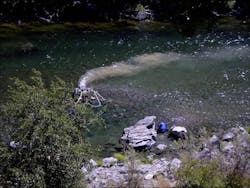EPA settles with Idaho gold miner for Clean Water Act discharge violation
SEATTLE, WA, DECEMBER 21, 2016 -- Robert Paul Rice Jr, of Idaho Falls, Idaho, and the U.S. Environmental Protection Agency have reached a settlement regarding Mr. Rice's Clean Water Act violation for the unauthorized discharge of pollutants to the South Fork Clearwater River. The discharges were a result of Mr. Rice's operation of a suction dredge in the South Fork of the Clearwater River on July 22, 2015. Mr. Rice agreed to pay a $3,600 penalty as part of the settlement.
EPA issued a National Pollutant Discharge Elimination System general permit in 2013 for small suction dredge operations in Idaho. To comply with the Clean Water Act, operators of small suction dredges must obtain NPDES permit coverage prior to operation.
The general permit covers small suction dredges with an intake nozzle size of five inches in diameter or less, powered by engines rated at 15 horsepower or less. The general permit places conditions on the discharge of rock and sand from each mining operation and prohibitions in certain vulnerable areas to protect water quality and aquatic resources.
At the time the violation occurred, suction dredge mining in the South Fork of the Clearwater River was prohibited to protect critical habitat for steelhead and bull trout under the Endangered Species Act. In addition, the South Fork of the Clearwater River is impaired under Section 303(d) of the Clean Water Act for sediment. In July, 2015, Mr. Rice operated in the South Fork despite the prohibition in effect at the time.
Since then, the US Forest Service completed an environmental assessment to evaluate dredging impacts on the river. As a result of that evaluation, a controlled number of NPDES general permit holders may now access the South Fork of the Clearwater for dredging. Miners wishing to operate their dredges in the South Fork of the Clearwater must first submit a "plan of operations" to the U.S. Forest Service prior to the dredge season.
